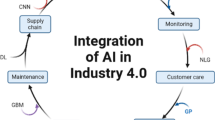Abstract
The chapter unfolds to recognizing ‘a better control’ as the fundamental aspiration to individuals and organizations. Towards its fulfilment, it discusses Industrial Revolution 4.0 as a technology-driven revolution where adaptation of artificial intelligence (AI) in different walks of life will result in creating cyber-physical systems. These systems will be the wheels of transformation in taking our factories, businesses, institutions and overall society into a more interconnected world of smart factories, smart production systems, smart cities and many such new paradigms. Functioning in a networked world with power of AI is not built in a day, and to make the link clear, a brief description of the present and past versions of Industrial Revolution is presented. Next, it moves to defining Industrial Revolution 4.0 and its likely impact in changing technology–job relationship. As we move into Industry 4.0, we foresee both quantitative and qualitative changes in the way jobs are crafted and executed. For instance, as an answer to the real-time demand of specialists or subject matter experts across the world, a new trend of autonomous or gig workforce is expected to rise. Lastly, it discusses developing systems approach as an essential qualification for managers and leaders to operate in a world of interacting systems.
Access this chapter
Tax calculation will be finalised at checkout
Purchases are for personal use only
Similar content being viewed by others
References
Acemoglu, D., Akcigit, U., & Kerr, W. R. (2016). Innovation network. Proceedings of the National Academy of Sciences, 113(41), 11483–11488. https://economics.mit.edu/files/13372 accessed January 30, 2021.
Andersson, S., Evers, N., & Griot, C. (2013). Local and international networks in small firm internationalization: Cases from the Rhône-Alpes medical technology regional cluster. Entrepreneurship & Regional Development, 25(9–10), 867–888.
Bland, T., Bruk, B., Kim, D., & Lee, K. T. (2010). Enhancing public sector innovation: Examining the network-innovation relationship. The innovation journal: The public sector innovation journal, 15(3), 1–17.
Brekke, T. (2015). Entrepreneurship and path dependency in regional development. Entrepreneurship & Regional Development, 27(3–4), 202–218.
Bureau, L. (2016). 5th Annual Employment Unemployment Survey 2015–16 conducted by Labour Bureau. Ministry of Labour and Employment, Government of India.
Chetty, S. K., & Stangl, L. M. (2010a). Internationalization and innovation in a network relationship context. European Journal of Marketing.
Chetty, S. K., & Stangl, L. M. (2010b). Internationalization and innovation in a network relationship context. European Journal of Marketing, 44(11/12), 1725–1743. https://doi.org/10.1108/03090561011079855
Coduras, A., Saiz-Alvarez, J. M., & Ruiz, J. (2016). Measuring readiness for entrepreneurship: An information tool proposal. Journal of Innovation & Knowledge, 1(2), 99–108.
Gates, D., & Bremicker, M. (2017). Beyond the hype: Separating ambition from reality in i4. 0. KPMG International. Retrieved Mayo, 4, 2019.
Hofkirchner, W. (2019). Social relations: Building on Ludwig von Bertalanffy. Systems Research and Behavioral Science, 36(3), 263–273.
Huws, U. (2016). New forms of platform employment. The Digital Economy and the Single Market.
Industrial Internet Consortium, Industrial Internet Reference Architecture, Version 1.7, 2015.
Industry 4.0: Challenges and solutions for the digital transformation and use of exponential technologies. Retrieved January 21, 2021, from https://www2.deloitte.com/content/dam/Deloitte/ch/Documents/manufacturing/ch-en-manufacturing-industry-4-0-24102014.pdf
Jalali, S. M. J., Park, H. W., Vanani, I. R., & Pho, K. H. (2020). Research trends on big data domain using text mining algorithms. Digital Scholarship in the Humanities.
Kässi, O., & Lehdonvirta, V. (2018). Online labour index: Measuring the online gig economy for policy and research. Technological Forecasting and Social Change, 137, 241–248.
Lawrence, P. R., & Lorsch, J. W. (1967). Differentiation and integration in complex organizations. Administrative science quarterly, pp. 1–47.
Lins, T., & Oliveira, R. A. R. (2020). Cyber-physical production systems retrofitting in context of industry 4.0. Computers & Industrial Engineering, 139, 106193.
Liu, Y., & Xu, X. (2017). Industry 4.0 and cloud manufacturing: A comparative analysis. Journal of Manufacturing Science and Engineering, 139(3).
Mashelkar, R. A. (2018). Exponential technology, industry 4.0 and future of jobs in India. Review of Market Integration, 10(2), 138–157.
Mehta, B. S., & Awasthi, I. C. (2019). Industry 4.0 and future of work in India. FIIB Business Review, 8(1), 9–16.
Mingers, J., & White, L. (2010). A review of the recent contribution of systems thinking to operational research and management science. European Journal of Operational Research, 207(3), 1147–1161.
Partanen, J., Chetty, S., & Rajala, A. (2014). Innovation types and network relationships. Entrepreneurship Theory and Practice, 38, 1027–1055. https://doi.org/10.1111/j.1540-6520.2011.00474.x
Peter, S. (1990). The fifth discipline. The Art & Practice of Learning Organization. DoupledayCurrence.
Retrieved January 21, /2021, from https://tulip.co/resources/industry-4-0/
Rojko, A. (2017). Industry 4.0 concept: Background and overview. International Journal of Interactive Mobile Technologies, 11(5).
Schwab, K. (2018). The global competitiveness report 2018. In World Economic Forum (Vol. 671).
Şener, S., & Elevli, B. (2017). Endüstri 4.0’da Yeni İşKollarıveYüksekÖğrenim. Engineering Minds Journal, 25–37.
Skinner, B. F. (1955). Section of psychology: The control of human behavior. Transactions of the New York Academy of Sciences, 17(7 Series II), 547–551.
Sundararajan, A. (2016). The sharing economy. The End of Employment and the Rise of. Retrieved February 23, 2021, from https://www.imf.org/external/pubs/ft/fandd/2016/06/pdf/book3.pdf
Van Assche, K., Verschraegen, G., Valentinov, V., & Gruezmacher, M. (2019). The social, the ecological, and the adaptive. Von Bertalanffy’s general systems theory and the adaptive governance of social‐ecological systems. Systems Research and Behavioral Science, 36(3), 308–321.
What does the future of Industry 4.0 mean for your job? Viewpoint—careers advice blog (hays.com) Retrieved February 03, 2021.
Xu, L. D. (2020). The contribution of systems science to Industry 4.0. Systems Research and Behavioral Science, 37(4), 618–631.
Author information
Authors and Affiliations
Corresponding author
Editor information
Editors and Affiliations
Rights and permissions
Copyright information
© 2022 The Author(s), under exclusive license to Springer Nature Singapore Pte Ltd.
About this chapter
Cite this chapter
Shukla, A., Dubey, A.M., Pandey, S.K. (2022). Operating in Industry 4.0: The Need for Gig-Workers and Systems Approach. In: Gupta, A., Tewary, T., Gopalakrishnan, B.N. (eds) Sustainability in the Gig Economy. Springer, Singapore. https://doi.org/10.1007/978-981-16-8406-7_15
Download citation
DOI: https://doi.org/10.1007/978-981-16-8406-7_15
Published:
Publisher Name: Springer, Singapore
Print ISBN: 978-981-16-8405-0
Online ISBN: 978-981-16-8406-7
eBook Packages: Business and ManagementBusiness and Management (R0)




